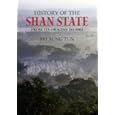by Naw Liang
in London, UK and Trieste, Italy

Mai soong kha everyone!
Athough this is a shorter posting than usual, it is no less important. As many Shan enthusiasts and productive academics can attest, the expanse of literature on the Shan literature is, though growing daily, lacking. After only a few years of investigation, interested can find that, without becoming multi-lingual or an expert researcher, additional information on the Shan can be difficult to find. So, when a new text focused on the Shan is born, it is bound to garner a wealth and wave of interest.
Such is the case with a recent publication on Shan history by acclaimed historian U Sai Aung Tun.
Published on 25 November 2008 by Silkworm Books, the South East Asian publishing specialist, History of the Shan State: From Its Origins to 1962 by Sai Aung Tun is hot off the presses and ready to impress (and stir up debate) on this latest attempt to package the history of the Shan State and its people. Sai Aung Tun, a noted Professor of History and International Relations at colleges throughout Burma/Myanmar as well as a member of the Myanmar Historical Commission, has published widely on the Shan and the Shan State, though only a few of his works are available in English and online; read his article on Tai Ethnic Migration for "Dynamics of Ethnic Cultures Across National Boundaries in Southwestern China and Mainland Southeast Asia: Relations, Societies, and Languages" edited Hayashi Yukio (Kyoto University's CSEAS) and other works (such as Tun's National Library of Australia profile page here) for some insight.
At the moment, Sai Aung Tun has taken on the task of trying to unravel, understand and express the history of the Shan State until the events of 1962 - the period in modern Shan history. While it is unclear (I haven't been able to get my hands on a copy yet) whether or not his politics, affiliations and supervisors will colour this historical text, I sincerely hope that this, as a native Shan and with unlimited access, Sai Aung Tun had endeavoured to create a brilliant and insightful work for Shan enthusiasts worldwide to devour and debate for some time to come.
For now, best of luck getting your hands on a copy - either through Amazon, other sellers or your local (and well stocked) library - and leave your comments (good and not-so-good) at will. I look forward to hearing what our enlightened community has to say.
Gyan cha tha ba seh.
Naw Liang
3 comments:
Hi Naw Liang,
Haven't popped in for quite a while I noticed!
I'm quite happy to see a work on Shan history - I wondered myself on what kind of primary sources are out there and whether it must be a huge task to scrape together scarce historical records. This is a common problem in Southeast Asian history.
There is an interesting thing though. I watched the Thai movie of "King Naresuan" with some Shan friends beginning of this year. I was amazed to which degree they identified themselves with Bayingnaung. That was particularly the case with those coming from the northern Shan State. (But they know all the big Thai actors - but that is a different topic)
Anyway, national histories have obviously done their job in pervading the conscience of ethnic minorities - which is sad. Therefore it is even more important to have books like this -for all the obstacles they encounter in gaining the sources - to bring a notion of an own history into the minds of those who live with a dictated history of others.
PS. This is also the case of those in northern and northeastern Thailand who have to view their past from the eyes of the Bangkok elite.
Thanks Phangpawn Noi
(Another name I need to follow...and welcome!)
It is good to hear your comments regarding Shan and wider Southeast Asian history. I find it intriguing that it this veritable resource minefieldis often sans reliable, widely available and comparable/contrastable resources. So many researchers, scholars and others rely on one 'find', often basing their entire theory/belief/take on that individual account; risky business that. In any other area, field or region, such an approach would be reproachable, but, in Southeast Asia it not only occurs, but appears to be de riguer. I wonder about all the scrolls and other literature that is lying - unknown, hidden or otherwise - in Shan temples throughout the Shan State and what views they might reveal and, in turn, spawn....
And I completely agree with your thoughts on national histories subverting or, let's be blunt, brainwashing in majority (and external) concepts and washing away internal histories of ethnic minotiries. The Shan are a perfect example of this. That is why, as you say, this text is of vital importance, even with its obvious political leanings and majority control. When there is too much literature, the numerous opinions that are bred require tireless discussion, debate and deconstruction for clarity; when literature is in short demand, anything, even jaded, is a blessing. In this case, only applause can greet Sai Aung Tun's work. I cannot wait to get my hands on a copy...
Thanks again, and feel free to comment anytime.
Naw Liang
Hi Colin,
just to let you know that Phangpawn Noi is my writer name of another blog I have on Blogger. They have taken it as a name for my whole account. But in fact it's just me Tinya aka Hseng Hpa ;)
Have a nice day!
T
Post a Comment